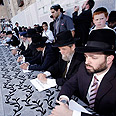
Don't pay for religion
Op-ed: Israel does not need huge government apparatus that provides religious services
Over the course of his life, a secular or religious Jew in Israel only encounters the religious establishment a few times. Upon being born, he is registered at the Interior Ministry branch at the hospital; a distinguished Mohel is summoned to perform the circumcision ceremony; one’s bar mitzvah is held at the synagogue.
Israeli citizens encounter the religious establishment directly for the first time when they register their marriage. As Israel does not offer the option of civil marriage, the young couple must register at the rabbinate, pay, and find a suitable rabbi to perform the wedding ceremony. The bride also has to go to the mikveh, which is operated by the religious council in her area of residence.
One encounters the religious establishment yet again, heaven forbid, should the couple decide to divorce. The next encounter will come when the time comes to depart this world. At that point, the Chevra Kadisha burial society conducts the burial ceremony, at times in exchange for significant fees.
There is no justification for maintaining apparatuses that enjoy such huge budgets for the sake of so few encounters. We are talking about offices, secretaries, religious councils’ chairmen, their deputies, and their associates. We should also note that these people always happen to be haredim, who make a living this way – that is, we support them in our role as taxpayers.
Inflated apparatus
Make no mistake about it: As one who considers herself a traditional Jew and an enthused fan of the Jewish religion, I believe that there is room for providing religious services to the public and supervising them. However, I do not believe that there is room for the large apparatus that envelopes these services, which the haredim don’t use in any case.
After all, the haredim have their own apparatuses, their own rabbis, and their own registration means, for marriage for example. Most of us cannot use the mechanisms used by the haredim. All of us, seculars and less devout religious, are excluded.
I believe that religious services should be managed within a small unit at the existing municipal apparatus, and I also think there is no room for imposing fees for these services. The payment should be included in the municipal taxes.
I also believe that a woman or a man possessing excellent management and organization skills, regardless of whether they are religious or secular, should compete in a tender and head this unit, and that will resolve the issue.










